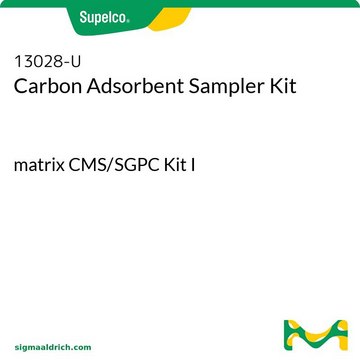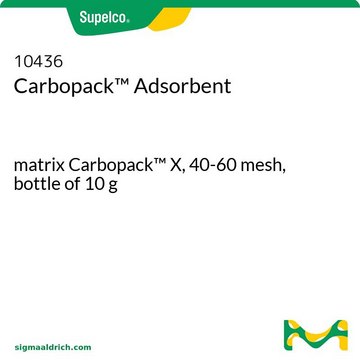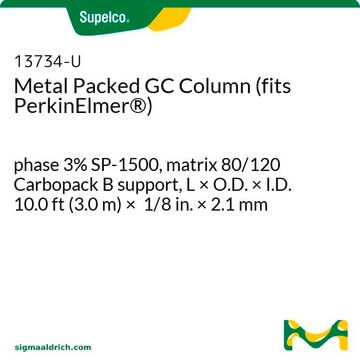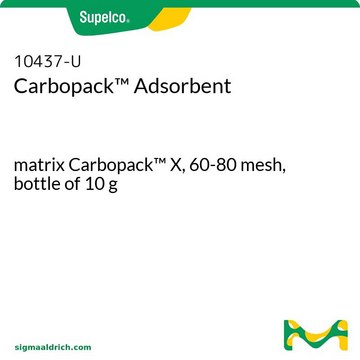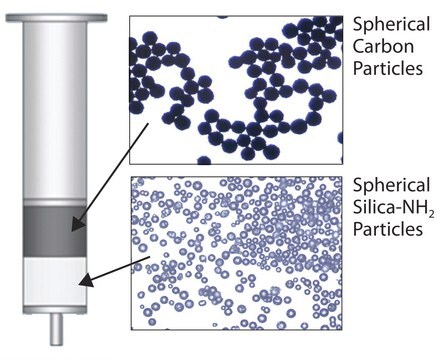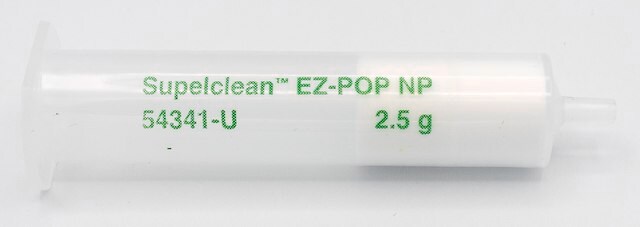11021-U
Graphsphere™ Carbon Adsorbent
matrix Graphsphere™ 2016, 60-80 mesh, bottle of 10 g
Synonym(s):
polymeric adsorbent, FormerlyCarboxen® 1016, 60-80 mesh
About This Item
Recommended Products
Product Name
Graphsphere™ Adsorbent, matrix Graphsphere™ 2016, 60-80 mesh, bottle of 10 g
description
Formally Carboxen® 1016
Quality Level
product line
Carboxen®
Graphsphere™
form
powder
packaging
bottle of 10 g
technique(s)
LPLC: suitable
surface area
~75 m2/g
matrix
Formally Carboxen® 1016
Graphsphere™ 2016
matrix active group
carbon
particle size
60-80 mesh
pore size
~0.34 cm3/g mesoporosity
~0 cm3/g macroporosity
~0 cm3/g microporosity
~0 Å pore diameter
density
~0.41 g/mL (free fall density)
application(s)
sample preparation
separation technique
reversed phase
Related Categories
General description
- Spherical (better packed bed performance than granular particles)
- Hard and non-friable (pack well, will not break)
- Used for molecules with an analyte size relative to C5-C12 n-alkanes
- Hydrophobic (can be used in high humidity environments)
Generally, SGPC adsorbents offer weaker relative adsorptive strength compared to carbon molecular sieve (CMS) adsorbents, and similar relative adsorptive strength compared to graphitized carbon black (GCB) adsorbents. Our Graphsphere™ products are a type of SGPC adsorbent. They are great alternatives to GCB adsorbents (which are granular and friable).
For more information about any of our specialty carbon adsorbents, please visit sigma-aldrich.com/carbon
Legal Information
Not finding the right product?
Try our Product Selector Tool.
Storage Class Code
11 - Combustible Solids
WGK
nwg
Flash Point(F)
Not applicable
Flash Point(C)
Not applicable
Choose from one of the most recent versions:
Certificates of Analysis (COA)
Sorry, we don't have COAs for this product available online at this time.
If you need assistance, please contact Customer Support.
Already Own This Product?
Find documentation for the products that you have recently purchased in the Document Library.
Customers Also Viewed
Articles
Carbon Molecular sieves (CMS) are a versatile range of adsorbents that can be tailored for specific applications. Supelco® scientists have been synthesizing synthetic CMS carbons for several decades, starting from tailoring of the starting polymers/copolymers, to modifying the final properties of the subsequent CMS carbon.
Our team of scientists has experience in all areas of research including Life Science, Material Science, Chemical Synthesis, Chromatography, Analytical and many others.
Contact Technical Service
